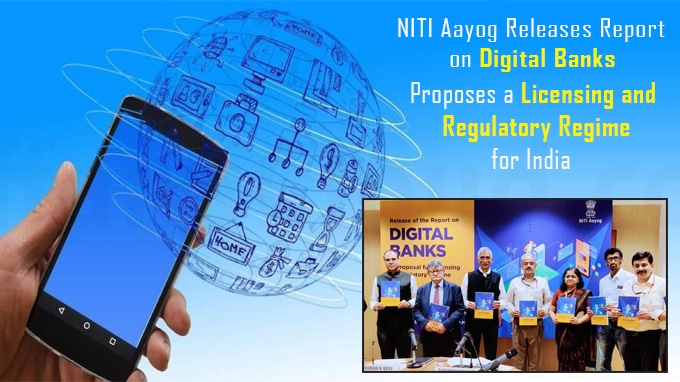
The Central Government think tank, National Institution for Transforming India (NITI) Aayog releases its report on digital banks, titled ‘Digital Banks: A proposal for Licensing and Regulatory Regime for India’ offering a template and roadmap for licensing and regulatory regime for India.
- It focuses on avoiding any regulatory or policy arbitrage and offers a level playing field to incumbents as well as competitors.
- The report was released by NITI Aayog Vice Chairman Suman Bery; and CEO (Chief Executive Officer) Parameswaran Iyer; and Senior Adviser Anna Roy, in the presence of other officials.
Report Assessment:
It is based on an equally weighted Digital Bank Regulatory Index which comprises of four factors viz:
- Entry barriers
- Competition
- Business restrictions
- Technological neutrality
The elements of these four factors are then mapped against the five benchmark jurisdictions of Singapore, Hong Kong, United Kingdom (UK), Malaysia, Australia and South Korea.
Recommendations by Report:
i.Issue of a restricted digital bank licence: It will be restricted in terms of volume/value of customers serviced and the like.
ii.Enlistment (of the licensee) in a regulatory sandbox framework enacted by the Reserve Bank of India (RBI).
iii.Issue of a full-scale digital bank licence: It will be contingent on satisfactory performance of the licensee in the regulatory sandbox, including salient, prudential and technological risk management.
As per the report, Digital Business bank may be required to bring in Rs 20 crore of minimum paid-up capital in the restricted phase. Upon progression from the sandbox a full-scale Digital Business bank will be required to bring in Rs 200 crore.
What is a Digital Bank?
A digital bank would be a bank defined in the Banking Regulation Act, 1949, and will have its own balance sheet and legal existence. It will be different from the 75 Digital Banking Units (DBUs), which was announced by Finance Minister Nirmala Sitharaman in the Union Budget 2022-23.
India’s Financial Inclusion:
India has made rapid strides in furthering financial inclusion. However, credit penetration remains a challenge, especially for India’s 63-million-odd MSMEs (Micro, Small & Medium Enterprises) that contribute 30% to GDP (Gross Domestic Product), 45% to manufacturing output, and 40% to exports, while creating employments.
i.A broader Digital India revolution catalyzed by Pradhan Mantri Jan Dhan Yojana (PMJDY), India Stack, e-KYC and UPI led a paradigm shift in the way India interacted with and consumed financial services.
- Pradhan Mantri Jan-Dhan Yojana (PMJDY) is National Mission for Financial Inclusion to ensure access to financial services, namely, a basic savings & deposit accounts, remittance, credit, insurance, pension in an affordable manner.
ii. Jan Dan-Aadhar-Mobile (JAM) trinity and Aadhaar, Unified Payments Interface (UPI) catalyzed financial inclusion/ digitization in India.
- Aadhaar authentications have passed 55 trillion.
ii.UPI recorded over 4.2 billion transactions worth Rs 7.7 trillion in October 2021.
iii.Direct Benefit Transfer (DBT) was also made digitally under Pradhan Mantri Kisan Samman Nidhi (PM-KISAN) and PM Street Vendor’s AtmaNirbharNidhi (PM-SVANIDHI).
iv.India will also operationalize its own version of open banking through the Account Aggregator (AA) regulatory framework enacted by RBI. Once commercially deployed, the AA framework is envisaged to catalyze credit among under-served groups.
Recent Related News:
i.RBI released the ‘Report on Currency and Finance (RCF)’ for the year 2021-22 on the theme ‘Revive and Reconstruct’. In accordance to its Chapter-VI ‘A Policy Agenda for Post-Covid-19 India’s feasible range for the medium-term steady state GDP (Gross Domestic Product) growth is 6.5-8.5%.
ii.The National Report of the fifth round of the National Family Health Survey (NFHS)– National Family Health Survey 2019–21 (NFHS-5), was released by Union Minister Dr. Mansukh Mandaviya, Ministry of Health and Family Welfare (MoHFW), Government of India (GoI) at the ‘Swasthya Chintan Shivir’ held in Ekta Nagar(previously known as Kevadia), Gujarat.
About National Institution for Transforming India (NITI) Aayog:
It was formed via a resolution of the Union Cabinet of the Government of India.
Establishment– 1 January 2015
Headquarters– New Delhi, Delhi




